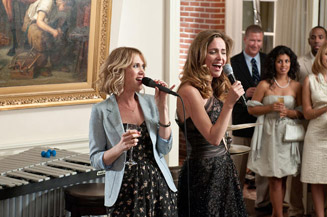|
|
Movie Review: BridesmaidsBy Matthew HuntleyMay 18, 2011
None of the wedding-related predicaments in Bridesmaids are all that new to the movies, especially comedies, but it’s been a while since they’ve been this funny, and it’s not the situations that stand out as much as Kristen Wiig. This is her show and she makes Annie such an enormously likable and sympathetic person that we have nothing but affection for her. This is sure to be Wiig’s breakout role, and she’ll likely have many more like it, but this will go down as the one that started it all. It probably wasn’t hard for Wiig to play Annie (she co-wrote the screenplay with Annie Mumolo, and she probably wrote a lot of herself into the character), but her personality fits here. What other woman would be so willing to climb a gate and risk public humiliation instead of asking that it be opened; or pick a fight with a teenage girl and not care about what she’s doing; or wrestle with a giant cookie? Wiig is up to the challenge and, like Julia Louis-Dreyfuss and Tina Fey before her, willing to go any distance for a laugh, and boy does she get them. Not all the scenes in the movie are necessary, which is another mark of an Apatow production: they tend to go on too long and are sometimes too in love with themselves. For instance, the scene when Annie and Helen square off in a tennis match feels tacked on just so we can see people getting hit with a ball in slow motion; and I wish the dress fitting scene could have been handled without stooping to toilet humor. That’s not to say it wasn’t mildly amusing, but such humor has become so easy and commonplace it feels lazy and second-rate, as if the filmmakers resorted to it. Instead of resorting to anything, why not brainstorm and come up with a better idea? Scatological jokes seem so old and cheap nowadays. The same goes for the aforementioned Jon Hamm character, who’s simply made the stereotypical jerk and has no other personality traits. On the other hand, a nice subplot develops when Annie starts dating a local cop (Chris O’Dowd). He’s the default “sweet guy” but O’Dowd makes him fresh and appealing and an inspired sequence takes place when Annie does all she can to get his attention so she’ll arrest her. You wish the movie had more moments like these to replace the poop jokes. Above all, Bridesmaids, is sweet and often laugh-out-loud funny. It’s the best Apatow-associated comedy since Forgetting Sarah Marshall, which is saying a lot. Going in, I thought it was merely going to be a female version of The Hangover, which is more or less how it’s being marketed, but it’s actually funnier and holds its own as a tight, original comedy. In fact, there’s a point when the characters are on their way to Vegas and I started to anticipate the forthcoming party, drunk and strip club scenes (along with the usual montage of the Las Vegas strip), which we’ve seen time and again. But to my surprise, the characters take a detour and the movie decides to go somewhere new and different. That’s where all comedies should strive to go.
|

|
|
|

|
Thursday, October 31, 2024
© 2024 Box Office Prophets, a division of One Of Us, Inc.


